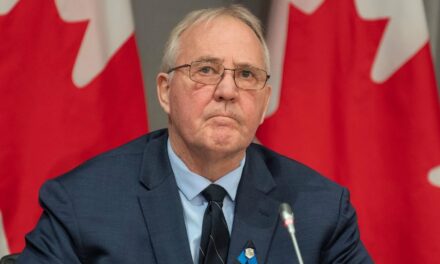In 2023 and the onset of 2024, significant global and industry events shaped the landscape of the Canadian Liquified Natural Gas (LNG) segment. Shannon Joseph, Chair of Energy for a Secure Future, a non-partisan civil society initiative, which aims to facilitate building a secure energy future for Canada, shared insights into the segment in an interview with New Pathway – Ukrainian News. The discussion aimed to offer a thorough retrospective of the past year while providing valuable perspectives on the future trajectory of this important industry, integral to the Canadian economy and assuming an ever-growing role in global economic and political spheres.

Shannon Joseph
Yuri Bilinsky: Let’s have a roundup of the developments in Canada’s LNG sector in 2023. Your paper Canada’s LNG Opportunity: A Value Proposition Worth Celebrating, which came out last summer, lists seven current and proposed LNG projects in BC. What is their status now?
Shannon Joseph: Some projects are waiting to be approved. Like Ksi Lisims, which has just submitted their application to the BC environmental review process. Other projects are under construction, some are thinking about moving forward. LNG Canada Phase 1 is under construction and should be completed in 2025. The pipeline that was going to supply LNG Canada Phase 1 and Cedar LNG – the Coastal Gas Link pipeline – reached mechanical completion, just before the holidays. That was a pretty important announcement, for a critical piece of infrastructure. Cedar LNG is not under construction yet, but it did receive its environmental approval and is waiting for the final investment decision. Woodfibre is supposed to begin construction soon and they have all the things they need to go forward. LNG Canada Phase 2 is now something people are talking about in a serious way. One of the big question marks around that project is, how important will it be for that facility to be electrified? And, given what the BC government has said about its need for new electrical generation, what does that mean in terms of the BC climate plan?

If a majority of these projects go forward, it would represent an important contribution globally on the energy side, and can be helpful on the emissions side, in addition to all the domestic value they can provide, including jobs, reconciliation, diversification of local economies, etc. In terms of the global need for LNG, there's a definite need and opportunity for Canada that would justify LNG Canada Phase 2.
Yuri Bilinsky: The problem for Canadian LNG projects is that if the country exports more energy, it could be penalized for its increased emissions, although the global emissions will actually go down. Is there a way to avoid this problem and develop Canada's energy sector?
Shannon Joseph: Paris Agreement is designed in a way that basically puts a silo around countries, this is a real problem for Canada and other energy producing nations. Every country has to make a contribution to global emissions reduction, but this is understood purely in terms of emissions reductions in-country. That is not the most efficient way to do anything and certainly not the way that we supply goods to people around the world. We have a global trade system that keeps food and goods and other things affordable. Because energy is a globally traded commodity and because there's one atmosphere, we also should be looking at energy and emissions issues from a global perspective. Canada would have a harder time meeting its domestic targets, at least in the near term, if it were exporting LNG to other countries to get them off coal. At the same time, getting countries to switch from coal to natural gas would make a huge difference on the issue of global emissions. We saw this in the United States where switching from coal to natural gas power generation allowed the U.S. to cut its emissions by over 584 million Metric Tonnes CO2 from 2005-2019, which is more than UK, Germany, Japan, France, and Greece combined.

At the end of the day, if we achieve our domestic emissions target, but leave other countries in a situation where their emissions increase because they don't have other energy options, then we are not helping. Many people in the ESF network, including Dominic Barton (Chair of Rio Tinto and Chair of LeapFrog Investments), who did a video for us, are saying that we can't tie our hands in this way. We need to think globally about how to tackle these issues.
Yuri Bilinsky: Is anything changing in this respect? Because if nothing changes, it will remain the impediment for Canada’s energy sector.
Shannon Joseph: There is a mechanism within the Paris agreement called Article Six that could help solve this. The rules around it have been finalized but have yet to be widely applied. Some of the rules that are known don’t really work that well for the needs that are out there. So, some things do need to change. Countries are willing to trade and share credits, these things are possible. Where there's a will there's a way and there's a big interest, especially in light of the geopolitical issues around energy security caused by the Russian invasion of Ukraine, for Canada to work with its allies to find ways to make it work bilaterally, even if it doesn't quite fit the multilateral framework we've been dealing with until now.
Yuri Bilinsky: The big issue around Canada’s East Coast LNG projects, which could export LNG to Europe to help push Russia out of that market, is pipelines infrastructure. To bring natural gas to the East Coast, the current pipelines would need to be upgraded. What's your assessment of that?
Shannon Joseph: I would say two things on this issue. Europe needs LNG and has been going all over the world looking for it. Because natural gas is now a global commodity, anything we do to get more natural gas, and more LNG into the world system, benefits the whole global system. Early in Russia's invasion of Ukraine, there were competitions on the spot market for natural gas that resulted in ships, which were already bound for Asia, turning around and going to Europe because Europe outbid Asia. Those countries, which lost out on their natural gas, generally reverted to coal to meet their energy needs. So, number one, if Canada could actually get our West Coast facilities operating and getting natural gas into the world system, that will help our allies in both Europe and Asia. On your specific question of infrastructure, it is worth noting that there is natural gas already on Canada’s East Coast that hasn't been developed. For example, projects like Newfoundland and Labrador LNG intend to use the gas that already gets pulled up during offshore oil production. We have the leader of the Miawpukek First Nation and the Mayor of St. John's involved in our initiative, because there's a real interest in Atlantic Canada in playing a role in this space. Yes, if we wanted to bring gas from the west to the east for export, we would need to upgrade a lot of the infrastructure to make that possible. And that is a process in itself. But I'd also say, Atlantic Canada and eastern Canada have natural gas resources that could come into play here. A challenge for those assets is that Canada's regulatory system for major project approval is not easy, and doesn't lend itself to doing these things quickly. But just like Germany was able to build an LNG intake facility very quickly when they needed to, I think Canada could do things in a way that is environmentally responsible, but also still gets things done so that we meet the needs of our international allies.
Yuri Bilinsky: Is there the economic case for this kind of substantial investment for either upgrades to the pipelines or extraction of natural gas in the eastern provinces?
Shannon Joseph: What would help unlock the economic case enormously, is for the projects that are already in the pipeline in the West to move forward. That will show that you can get things done in Canada. And that's why we think it's so important to look at these western projects in that global energy context.
Yuri Bilinsky: In terms of the East Coast projects’ economics and financial models, do you think that the long-term forecast for natural gas demand and prices will justify the East Coast infrastructure investment and LNG projects?
Shannon Joseph: The fact that we see long term deals being signed all over the world to secure LNG supply, whether it's in Asia or Europe, speaks to the need for this energy. We have a growing population that wants to improve its standard of living and energy is central to this. Every country of the world is working towards improving their standards of living and Canada could help make this possible as a reliable and secure energy supplier.
The German deal with Qatar was the breakout long term agreement. Japan signed a very large deal with Australian LNG producers and those conversations go on. Energy For a Secure Future has spent a lot of time engaging the diplomatic community. One of our members just came back from a trip to China, she was part of a trade mission where she received the clear message: ‘we still need Canadian LNG.’ Everything I've heard from in the international world, including from players at the COP28 meetings in Dubai, is ‘we need this energy from Canada.’ As a country, we need to look at how we can get it to them.
Yuri Bilinsky: You mentioned regulatory environment. The Supreme Court of Canada just struck the environmental assessment legislation. Do you think that will help Canadian LNG projects?
Shannon Joseph: For the ones that are just starting the approval process it could be helpful. It really depends on how the government responds to the Court's guidance. The Court identified that many parts of the legislation were unconstitutional. A lot of that has to do with the federal government having the power to assign for review projects that are fully within a province’s jurisdiction. I think there are other aspects of the Impact Assessment Act that need improvement, including the many areas of discretion the federal Minister has to assign projects, override agency recommendations, etc. The fact that a project can go through a whole technical review and still be denied at the end for political reasons, is very problematic. It certainly doesn’t encourage people to invest in Canada. As the government looks at making improvements and responding to the court, I do hope that they also look at some of these things that were identified by industry and others. It could help people to have more confidence that Canada's system isn't arbitrary, because that's how it currently feels.
Yuri Bilinsky: In this respect, what do you make of the U.S. President Joe Biden’s latest pause on approvals for pending and future applications to export LNG from new projects?
Shannon Joseph: It is unfortunate that the U.S. government has chosen to go down this road. It is not a good decision for the U.S. economy or jobs, it is not good for the environment as many countries will revert again to higher emitting fuels when they can’t access natural gas. And it is not good for the security interest of the U.S., Canada or our allies around the world. It is worth noting that even though Canada has no operating LNG export facilities right now, we have been supplying world customers through LNG facilities on the U.S. Gulf coast. Canadian natural gas is an important part of U.S. contribution to global energy security – a growing part – and this decision will negatively impact Canadians, their jobs, Indigenous communities involved in the upstream. I very much hope that the Biden Administration can be prevailed upon to consider this bigger picture.
That said, this decision should encourage Canada to get even more committed to our own plans to be a world LNG supplier. There is a significant value proposition for us to play a global LNG role and I would expect that many of our allies will look to us even more to deliver.
Yuri Bilinsky: Going forward, are you more optimistic about the Canadian LNG segment than you were 12 months ago?
Shannon Joseph: I am, because I hear increasingly positive messages about this. And more and more people are talking about it. More people are talking about Article Six of the Paris Agreement, as a way for Canada to get credit on the environmental side for its energy. That's a very good thing. I think if we're having the conversation, and people continue to do the good work to get projects approved and built, I truly believe we can get to a good place as a country.
Share on Social Media







































